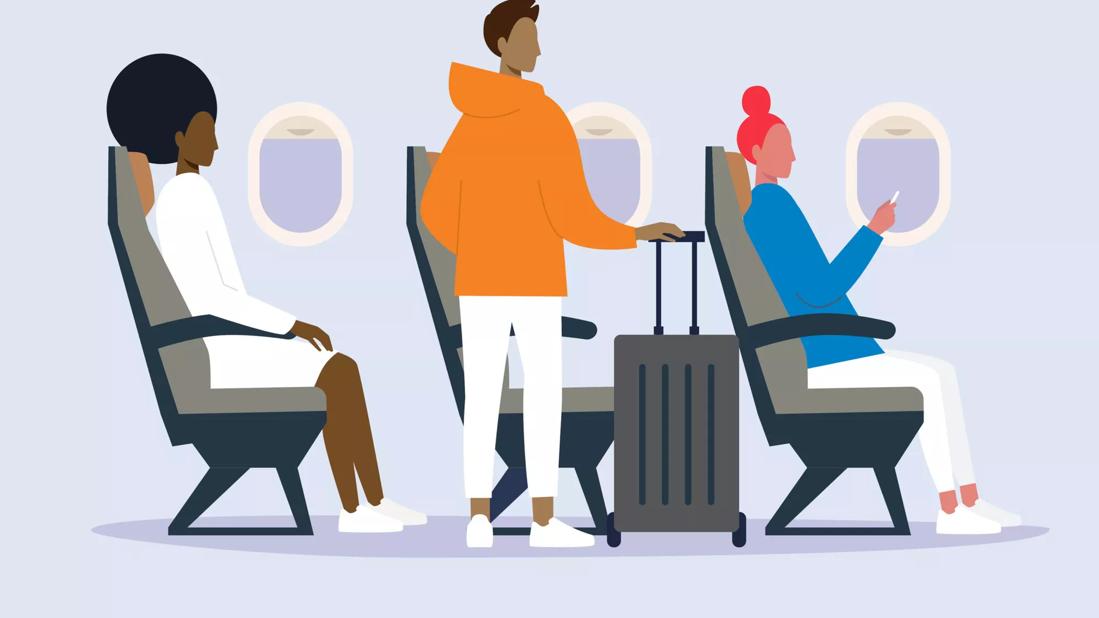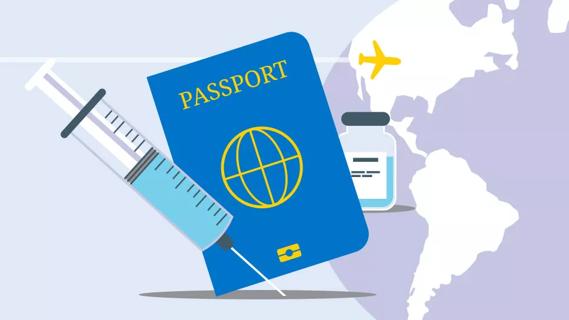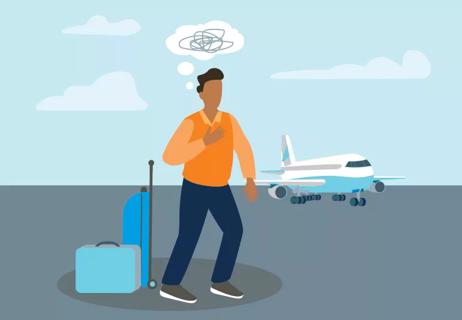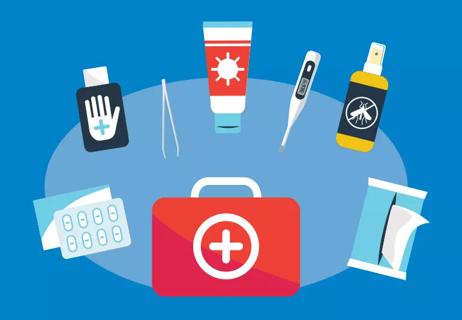Flying can cause dehydration and bloating and make you feel tired and stressed

It’s not just your imagination — flying in an airplane can zap your energy, dry your skin and make various body parts feel different or weird.
Advertisement
Cleveland Clinic is a non-profit academic medical center. Advertising on our site helps support our mission. We do not endorse non-Cleveland Clinic products or services. Policy
How come?
“The pressure, temperature and oxygen levels in the cabin fluctuate, and the humidity level is lower than it is at sea level,” says family medicine physician Matthew Goldman, MD.
All of those things can mess with some of your body’s normal functions. Then, there’s the actual process of traveling, which could involve switching time zones and coming in contact with dozens or even hundreds of other people.
Dr. Goldman explains why airplane travel affects your body and shares tips for a smooth takeoff and landing.
What are the side effects of flying? Here are some ways airplane travel can affect your body, and some preparations you can make to have the healthiest travel experience possible.
Even before you step foot on the airplane, you’re bombarded with stressors — slow-moving lines, worries about being on time and luggage that you have to move across the airport, Dr. Goldman says. Then, you get on the plane, where you may be scrunched in an uncomfortable seat and rubbing elbows with strangers. It can all be one continuous test of your patience.
What you can do: Plan ahead as much as possible to minimize stress. Pack any medications you’re bringing in a carry-on bag, rather than in your checked luggage, so they won’t get lost. Alert the airline when you book your ticket if you have diabetes or another condition that would warrant a special meal and/or snack.
Advertisement
Why do you get dehydrated when you fly? Airplane cabins have very low humidity levels, Dr. Goldman explains, because about 50% of the air circulating in the cabin is pulled from the outside, and at high altitudes, the air is almost completely devoid of moisture. This might cause your throat, nose and skin to feel dry.
What you can do: How do you stay hydrated when flying? Dr. Goldman suggests packing an empty water bottle in your carry-on that you can refill after going through security and take with you on the plane. That way you don’t have to rely on those tiny drinks from the beverage cart to get you through a multiple-hours flight.
Wear glasses instead of contacts to help prevent discomfort to the eyes. And pack small bottles of lotion, eye drops or nasal spray if you’re worried about drying out.
You might think that recirculating air in the cabin would make you prone to getting sick, but commercial airlines actually have advanced filtering systems that remove most bacteria, fungi and viruses from the air. What’s more likely to make you sick is close proximity to so many other humans and their germs.
“We can catch something from other passengers who are coughing, sneezing or even just breathing nearby,” Dr. Goldman notes. Tray tables, seatbelt buckles and other surfaces that are frequently touched may also be covered with germs.
What you can do: Talk with your healthcare provider about a flu shot and any other vaccines like COVID-19 or RSV that may be right for you. Carry a small bottle of hand sanitizer with you and be sure to wash your hands thoroughly throughout your travel.
You may even want to consider wearing a mask. Research on wearing masks to prevent respiratory illnesses such as colds, flu and COVID-19 has shown varying levels of effectiveness depending on factors like mask type, fit and compliance, says Dr. Goldman. He says it’s important to note that research on mask efficacy continues to evolve and recommendations may change based on new findings and emerging variants of respiratory viruses.
Air pressure is lower at higher altitudes, which means your body takes in less oxygen. Airlines “pressurize” the air in the cabin, but not to sea-level pressures, so there’s still less oxygen getting to your body when you fly, which can make you feel drained or even short of breath. The potential dehydration factor and sitting for long periods of time don’t help. Then, there’s the jet lag, if you’re traveling to a different time zone.
What you can do: Hydration is key. Get up and walk around if you’re sitting for more than a couple hours, and perform stretches in your seat, like picking your feet off the ground and flexing and pointing your toes, to keep blood flowing.
Advertisement
And if you’re traveling to a different time zone for just a day or two, Dr. Goldman recommends trying to keep your sleep schedule on your home time zone.
As the pressure in the cabin changes, the air pressure inside your inner ears try to adjust with it — this equalization is what helps you maintain your balance. Stress is placed around the middle ear tissue and eustachian tubes when the outside pressure changes quickly during takeoff and landing, which is why your ears may adjust by popping.
That imbalance can also contribute to motion sickness. That occurs when your brain receives conflicting messages about motion and your body’s position in space delivered from your inner ear, your eyes, your skin receptors and your muscle and joint sensors.
What you can do: Swallow or yawn to open the eustachian tubes, which control the pressure in your middle ear, during takeoff and landing. To minimize motion sickness, choose a window seat over the wing, where the degree of motion is lowest and you may be able to view the horizon.
Those same airplane pressure changes cause the gas inside your stomach and intestines to expand, which is why you may feel bloated.
What you can do: Pass on scarfing down a greasy burger and fries in the terminal and avoid any other foods you know could make your gas worse.
Advertisement
If you have a chronic medical condition, Dr. Goldman recommends carrying a copy of any important or recent medical records in case you need to be seen by a different provider while traveling.
And if you aren’t feeling well, it might be worth putting off air travel. If your eustachian tubes are clogged by inflammation from a cold or allergies, your ears might not be able to “pop” during takeoff and landing, which could cause pain and even damage the ear.
If you have more questions or concerns about traveling, or whether certain medications might help ease your travel issues, your provider can help with those decisions.
Advertisement

Sign up for our Health Essentials emails for expert guidance on nutrition, fitness, sleep, skin care and more.
Learn more about our editorial process.
Advertisement

Making a health plan with your doctor before you leave will make it easier to sit back and enjoy your flight

Among other benefits, a little time away can help make you more creative, decisive and focused

Setting realistic expectations and scheduling downtime can help reduce stress and make your time away more enjoyable

Dress baby in layers, gate-check your stroller and bring noise-canceling headphones

Plan early — getting the right vaccines can help you stay healthy on your travels

When the drive is familiar or monotonous, ‘procedural memory’ can take the wheel

Create a checklist, reflect on your needs and ask for help when unexpected delays occur

How to pack a well-stocked travel emergency kit

Even small moments of time outdoors can help reduce stress, boost mood and restore a sense of calm

A correct prescription helps your eyes see clearly — but as natural changes occur, you may need stronger or different eyeglasses

Both are medical emergencies, but they are very distinct events with different causes